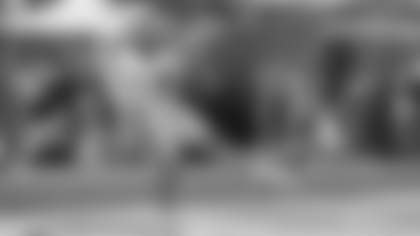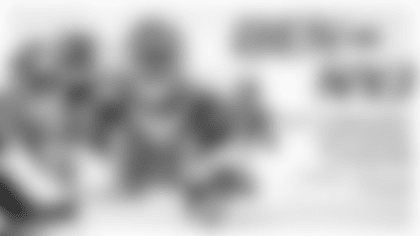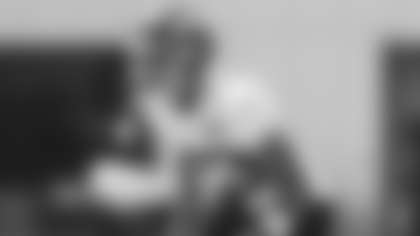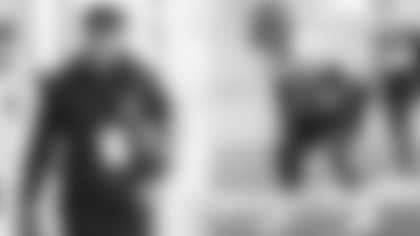Transcript of Jets head coach Eric Mangini's news conference before Thursday's midday practice:
In terms of yesterday's practice, it was very good. I liked the effort, liked the focus and liked the tempo. I thought we got out of the huddle, both offensively and defensively, quickly and some of that is a function of improving the show-team operation, which is really important. I liked the look that they gave.
One of the things that I emphasize to the team is that, during those individual periods, how important it is to not just practice the techniques associated with the team that we are playing but to use those opportunities. It could be individual, where you are actually helping out the other side of the ball, but to use those opportunities to continue to develop your personal skill set.
We spent a lot of time on those things during training camp, but you don't get anywhere near as much time during the regular season to do that, and that window is vital for that. I talked about that and also talked about the need, at the end of practice where we always do the two-minute drive, how important it is to use that to continue to develop our conditioning, our football shape and things like that. That's an ongoing process. It's the best. I really believe in it.
I have to give credit to Ted Marchibroda — that was his philosophy. That's what we always did there [with the Baltimore Ravens]. I just thought that was a really smart way to improve conditioning as well as doing football-specific things while you're conditioning and train your body to deal with the decision-making, the transition, all that stuff, when you've got less than a full tank.
Today we'll move on to the next phase of our installation, which is consistent with our regular Thursday.
On if he has any concern about the schedule this week…
It's a little bit different. It's not going to be very different on the front end, a little bit different there in terms of where we are having the walkthrough. We are going out a day early, which is something that the players voted on when I was originally doing the itineraries, a pretty strong vote to go out early for all of these West Coast trips.
We have spent a lot of time in the off-season researching, whether it be long flights or transition from time zones. John Mellody and his group and Sal Alosi and his group, they interviewed people, they talked to a lot of different people who have been in that situation. We've tried to incorporate those things in our prep.
On if he prefers the current schedule as opposed to scheduling some West Coast trips back-to-back…
I don't mind having it broken up. I've done the extended stay out on the West Coast, and it's been OK. When you look at Oakland, they pretty much fly out, whenever they go out to the east coast. They have had so many East Coast trips. With Bill Callahan on the staff, they've done it both ways there as well. When you look at wins-losses, doing it the different ways, it's not consistently skewed one way or the other or else everybody would follow the same package.
On his reaction when the 2008 NFL schedule was released…
We were down in Miami to start things off where it's nice and hot [smiles]. That was always good. Going to the West Coast four times just builds up the frequent-flyer miles. Maybe I can take a vacation to Disney after the season or something.
On the Arizona Cardinals staying east after they play the Redskins on Sunday…
Yeah, it's probably a nice area they are staying in, relaxing.
On WR David Clowney…
He's doing well. He's moving along with his rehab. No real timetable, just whenever it's ready to go. ... He's plugging along and at some point he'll be back with us.
On if bringing back special teams coach Mike Westhoff after training camp has created problems on special teams…
No, I don't think so at all. There haven't been a lot of punt return and kickoff return opportunities, more touchbacks. Mike Nugent got hurt the first week. I'd say that's uncharacteristic, but then you're transitioning there. That rarely happens. I don't think it's anything related to Mike and Kevin [O'Dea]. It's actually been a really good relationship, and their strengths complement each other. Having the other set of ideas at the coordinator level has been good. There've been some things that we've added and adjusted to, and they have been positive things.
On if this San Diego game will be a good test for the special teams…
Yeah, [Darren Sproles] is pretty [good]. Then you have [Kassim] Osgood and [Brandon] Siler. They have a host of guys that can cause problems. Both kickers are extremely effective.
On the Jets' offensive line…
There is really good chemistry. There has been good chemistry throughout training camp and throughout the early part of the season. That group as a whole with the mix of younger guys, older guys, we have some new guys from different systems in there, but you wouldn't know it.
It's a very good group in terms of the give-and-take in ideas, the way that they discuss things in meetings and the level of communication. Bill [Callahan] does an excellent job with that group. I spent a lot of time in that room in training camp, and it was always extremely productive meetings, fun to be in there.
On if not scoring a rushing touchdown after first-and-goal at the 3 on Sunday could be a "defining moment" for the line…
I don't think that's some sort of defining moment. It's the whole group. It's not just the offensive line in that situation. It's the tight ends and the running backs. I have total confidence in them, I have total confidence in Thomas [Jones], and I wouldn't hesitate to call a running play on the goal line again next time it happens.
On comparing RB/KR Leon Washington and Chargers RB/KR Darren Sproles…
They both are very productive in the kicking game. Sproles is a smaller guy but doesn't play small, and Leon is a little bit smaller guy but he doesn't play small. They are both explosive players. They are different in some ways as well.
But to be able to go from [LaDainian] Tomlinson to Sproles and have that same type of threat — he's so dangerous, not just with the ball in his hands, on running plays, but they threw that little swing pass to him. I forgot how many yards exactly, but it was a pretty impressive run there. He has great quickness and he has an excellent burst.
On Sproles' 66-yard catch-and-run…
Sixty-six, it was long. I stopped counting after 50.
On what challenges San Diego's offense poses…
It's a lot of things that jump out as challenges. [Antonio] Gates, [Chris] Chambers, Tomlinson, Sproles, [Philip] Rivers, a good offensive line, the ability to run and the ability to pass. They throw it short, catch-and-run, formation adjustments, different personnel groups. The list goes on.
On the similarities between the Chargers' and Patriots' explosiveness on offense…
You're talking about two very good offenses over time. Last year, New England's offense, however many touchdowns they scored [75], and that offense has been in place for a long time, and it makes it that much more efficient and you have to be on things that much tighter.
San Diego, they are extremely efficient as well. It's their ability to turn the short plays into long plays that makes them really dangerous, as well as being able to complement that with just pure throws down the field. Chambers against Carolina, they hit the deep one. Chambers against Denver, they hit the deep one. Throw Gates in the mix. Take your pick. It's whoever you want to choose that can hurt you.
On Rivers' development as the Chargers' QB…
Each year he gets better and better, and you'd anticipate that. Very talented guy. Brian [Schottenheimer] likes to call it "arm talent," but it's his ability to make every throw. He has all of those things. He can improvise and make some things happen. I don't know him personally, but through Brian, he just has an excellent work ethic, the way that he's continued to work at understanding not just the offense but the defense, and you just see the jumps each season and the problems that he creates.
On if Schottenheimer brought San Diego's offense to the Jets…
The system — and this has always been important to me, it was important to me when I interviewed Brian — it's bring in one system, but as you incorporate new ideas, it becomes the Jets system. It's the same thing defensively.
You insert the different coaches that we had, whether it was Noel Mazzone the first year, Mike Devlin there, their various experiences. Jimmy Raye, he was a coordinator and has a wealth of experience and he has familiarity with that system but he's been exposed to a lot of different systems as well. Now Brian Daboll, that family tree, Bill Callahan, that family tree, it all goes in.
What you're doing is trying to get the Jets system, and with the audibles and things like that, you turn those over quite a bit just to make sure that there can't be a jump on it just based on the verbal or hand signals.
On DT Kris Jenkins…
Going from a 4-3 to a 3-4, coming out of college, most guys are in 4-3 systems, like Vince [Wilfork] was in 4-3 and he went to a 3-4, Ted Washington, those types of guys. When you learn the technique and you're able to rep the technique and get better at it and understand how it simplifies a lot of blocking schemes as well and just drill those things, Kris is going to be disruptive in any system. He just is. He's playing with good technique and doing a good job reading the blocks, which makes it that much more challenging. The play last week, where they came in and tried to trap him, it's tough.
On if it was the play when he knocked the guard into the running back…
No, this is a different one. They were coming in from the edge to try to get him. It's typically not a lot of movement. We've tried it a couple of times during camp — good luck. The guy who is trapping him, he's sitting there going, "Why did they call this play?"
On if Jenkins has shared some cooking tips with the team…
Have we shared tips? No. We share eating tips. We eat a lot, often, high fat and high carbs. We have both been very effective at that. I saw his piece in training camp where he made some kind of eggs with truffle oil. I was impressed. It looked good. He has not really offered to cook here for us, but I'm sure if he did, it would be outstanding.
On how the Atlantic Health Jets Training Center has made his job easier…
It's designed so well in the ability to go in and out of meetings to walkthroughs and that type of thing. The three different grass fields, as opposed to the field and a half we had at Hofstra. The four outdoor fields. The indoor facility and the size of that, the ability to punt, kick, do any of those things in there without hitting the roof, that's always a huge plus. We haven't been in there yet, but at some point we will.
It's very education-friendly, and you spend so much time trying to learn tendencies, the opponent, all of those things. They have these giant boards in the room and you can draw anywhere. The video system is set up where you can watch the video and telestrate on the video. You can put documents up that will show, you don't have to make the transparencies — I don't know if transparencies are headed out or not — but this thing, whatever you want to do, you can pretty much do it. It's great to have that flexibility.
On the team handling adversity…
You go through that process every year. It's not just handling adversity. It's handling success. It's both those things. The goal is constantly, up, down, whatever the result is on Sunday, to come back and have a very consistent level of practice week in and week out and I can't stress that enough.
I'm sure they are tired of hearing me say it but I'll be consistent with it. That is the key. It's a long season. You can make a lot of jumps during the course of the season based on how you work, how you prepare your routines, and it's always a process. I really like the group of guys, a lot of true pros in the room and role models. All of those things have been positive.
On why officials ended the game against the Patriots on the penalty even after the 10-second runoff when time was remaining on the clock…
The clock runs after the 10-second runoff. That's an important thing in a two-minute situation. We had it in the day before the Green & White Game where there was a 10-second runoff and they stopped the clock. You get the 10-second runoff, but that doesn't buy you a timeout once they wind the clock. When we first practiced it in the spring, we had the 10-second runoff, the offense is in the huddle getting their play, and now the clock is rolling. It ended up being a 30-second play.
On burning timeouts…
I hate burning timeouts. I think it always comes back to a situation where you need them. The times where you have to make decisions are those scoring plays: You're in their red zone, they're in your red zone. At that point, if something is not right, that to me is a good use of time because it could really affect a scoring play. From a mechanical standpoint, to have to burn a timeout because of that, that's not something that I believe in at all and something that we should completely control. I don't like it. Don't want it.
On if he has spoken to the team about burning timeouts…
Yes, all the time and not just this year, every year. There are huge differences in two-minute drives with a timeout, without a timeout, and you just don't know what's going to happen. Without the ability to stop the clock or make an adjustment and do anything, not having that option, especially if you don't have that option because of something that was inherently in your control and you had to use it earlier, it's not acceptable.
On if it's human nature for players to want to call a timeout in certain situations…
Then retrain it, because it's not good.














